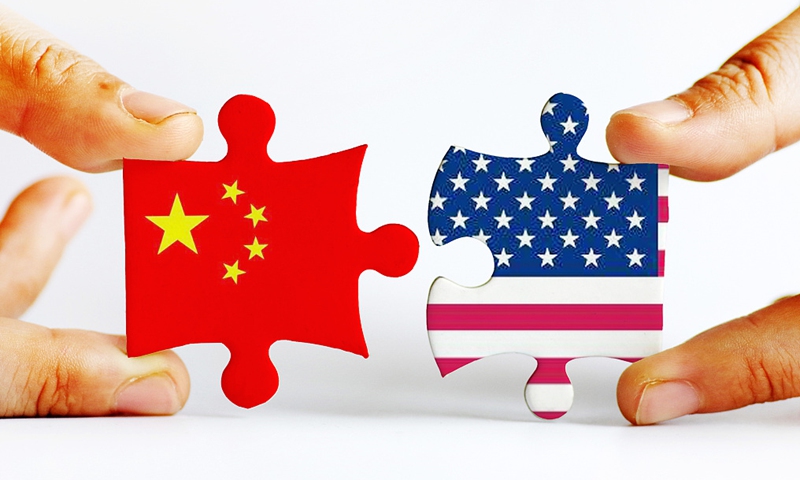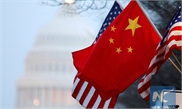US firms worry about 'rising tensions'
Survey reflects businesses' disappointment with Biden administration: expert

A view of the Lujiazui area, a financial zone, in Shanghai Photo: VCG
Many US businesses in China have reported rising bilateral tensions between China and the US as a top challenge, even as they remain confident in profit growth in China, calling on Washington to drop aggressive rhetoric and tit-for-tat actions and pursue communication, according to a survey published by the main US businesses group in China on Tuesday.
The survey reflected US companies' disappointment with US President Joe Biden's administration, which has not only kept in place tariffs and sanctions against Chinese products and companies but has even further escalated crackdowns on Chinese firms, a Chinese expert noted.
According to the survey from the American Chamber of Commerce in China (AmCham China), "rising tensions in US-China relations" was cited by 56 percent of respondents as the top business challenge.
Moreover, only 27 percent of members expect bilateral ties to improve this year, a sharp decline from 45 percent in last year's survey. Bilateral tensions were also cited for the first time as a top factor specifically contributing to staffing challenges.
"Over the course of last year, I think there is a new reality that has in a way set in, largely speaking, many of the policies or the sentiment left by the Trump administration remain in place with the Biden administration," Alan Beebe, president of AmCham China, said in response to a question from the Global Times at a press briefing on Tuesday.
In the past year, tariffs imposed by the Trump administration have remained in place, and a range of sanctions against Chinese firms have even widened to include more companies and individuals under the Biden administration, generating more uncertainty between the world's two largest economies.
In general, the closely-watched report reflected a sense of disappointment from the US business community with the Biden administration, since it has seemingly failed on some of its promises to them, Gao Lingyun, an expert at the Chinese Academy of Social Sciences in Beijing, told the Global Times on Tuesday.
The rising uncertainty felt by US firms in China is also a "wake-up call" for the Biden administration to make policy adjustments, Gao said.

China US Photo: VCG
According to the survey, key recommendations that AmCham members had for the US government include refraining from engaging in aggressive rhetoric and tit-for-tat actions, pursuing a results-oriented framework for regularized government-to-government communications, and a face-to-face meeting between the top leaders.
The Biden administration should listen to these views from the business community, Gao said, stressing the US government should first focus on the first two recommendations.
Beebe also expressed hope for the new US ambassador to China, saying the new envoy can hopefully promote more frank communications between the Chinese and US governments, and clarify misunderstandings.
The new US ambassador to China, Nicholas Burns, has arrived in China and will be in quarantine for three weeks, the US embassy said in a tweet on Saturday. The US has been without an ambassador in Beijing since Terry Branstad stepped down in October 2020.
The survey also noted that many member companies reported rising pressure from both China and the US on businesses to make (or not make) statements about "politically sensitive issues."
"It's worth noting that the Chinese government has never exerted any pressure on any foreign firms on so-called 'politically sensitive issues,' so there's no need to exaggerate or assume that," Gao said.
Despite the challenges cited in the survey, many respondents said China remains a top global priority, with many continuing to rely on the Chinese market for the growth of their global business.
The survey found that more than half of the members said their 2021 revenues were higher than in 2020, reversing a trend from the last few years. Compared with the previous five years, 2021 saw the highest proportion of companies estimating that they will be "very profitable" at 13 percent, compared with only 5 percent in 2020 and earlier.
Nearly two-thirds of the companies rank China as the top or a top-three priority for near-term global investment.
"The survey again proved foreign firms' recognition of China's business climate," Zhao Lijian, a spokesperson for China's Foreign Ministry, told a regular press conference in Beijing on Tuesday when asked to comment on the survey.
China will continue to deepen reform and opening-up, and create a market-oriented, law-based and global business environment, which will provide more opportunities for companies from all over the world, including the US, to invest in China, Zhao said.
"The nature of China-US economic and trade relations is mutual benefit and win-win results. We hope that the US side will retain the concepts of openness, inclusiveness, mutual benefit and win-win results, stop unreasonably restricting and suppressing Chinese firms, and create favorable conditions for the healthy development of China-US economic and trade cooperation," Zhao said.




